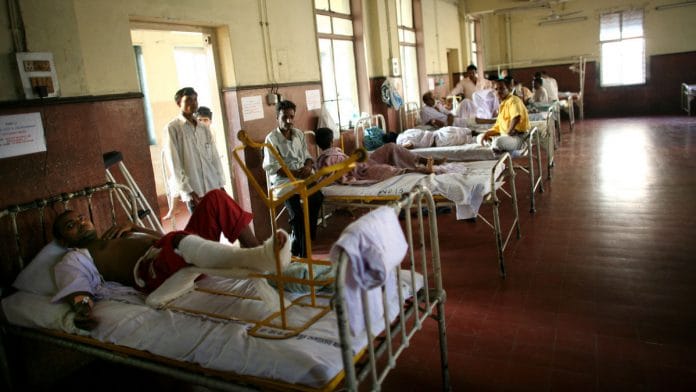New Delhi: The official tasked with implementing Ayushman Bharat, the Modi government’s flagship health insurance scheme, has proposed digitising health and wellness centres (HWCs), which will allow them to act as one-stop shops for beneficiaries in rural areas — from fixing appointments with hospitals to tracking the medical history of patients.
In a letter to the Ministry of Health and Family Welfare, Indu Bhushan, chief executive officer of the Pradhan Mantri Jan Arogya Yojana (PM-JAY), better known as Ayushman Bharat, has envisioned the HWCs, which are in the rural areas, as the ‘first point of contact’ for patients.
He has suggested an upgradation plan for the 1.5 lakh HWCs under the scheme, which involves creating a digitally-enabled feedback system between the empanelled hospitals and centres for better coordination.
To make the process less hectic for the patients, he has also proposed single-time registration — either at the centre or at the hospital.
“A common process of registration of patients and issuance of common health identifier is necessary,” reads the letter by Bhushan, who also heads the National Health Authority (NHA), which looks after the implementation of the scheme at the national level.
While the letter was written on 25 January, it is yet to get an official response from the Ministry of Health.
“The work on strengthening the HWCs is already underway. However, any official response looks unlikely before the elections,” said a senior official at the ministry.
Also read: Yoga for diabetes & ayurveda for pregnant women: What Ayushman Bharat has in store
What does the letter say?
The letter says that the HWCs should be enabled to set up appointments on behalf of beneficiaries by calling the most appropriate hospital — for the treatment and for the follow-up visits.
Moreover, to strengthen the centres to take better care of patients, the letter has proposed that these centres “should be enabled to retrieve the medical history and details of patients (submitted with the hospitals) for the follow-ups”.
The letter has also emphasised on the need to draft a referral policy — stating how and when a hospital or an HWC can refer a patient. “The referral policy should be formed carefully so that it cannot be abused,” reads the letter.
It has also suggested that the data collected from these centres and hospitals should be used for “the analysis of diseases and population health risk trends for preventive and curative health”.
The letter further proposes to strengthen the team of Asha workers who will be used provide the post-treatment or post-operative care at the centres.
Little progress on establishing HWCs
While the letter calls for upgrading HWCs, the Modi government has made little progress in operationalising them.
In February 2018, the Modi government announced the creation of 1.5 lakh HWCs, which were to be upgraded sub-centres and primary healthcare centres.
Although the government envisions these centres as one of the “base pillars” of the scheme, the progress in building them has been slow and the target remains a distant dream. Of the 1.5 lakh planned HWCs, only around 8,000 have been operationalised — a mere 5 per cent of the total promised.
Also read: How Narendra Modi’s Ayushman Bharat is fighting India’s health emergency







It is violence of court of conduct and pharmacy council of india. No person other than a Registered Pharmacist can dispense
medicine- Court judgement
Pharmacy Council of India
File No. 2-26/2016-PCI
Extract of the common judgement/order dtd. 23.8.2017 delivered by the Hon’ble High
Court of Kerala in W.P.(C).No. 37156 of 2016 and Contempt Case (C)No. 103 of 2017
regarding dispensing of medicines by persons other than registered pharmacists.
1. The Directorate of Health Services, Thiruvananthapuram vide letter No.PH2- 43243/16/DHSdtd. 24.6.2016 directed the District Medical Officers (H) of various districts
to restart NCD medicine distribution at sub-centre level like other national programmes and
maintain the sub-centre level stock book and distribution list. This was followed by the
circular dtd. 28.10.2016 stipulating how the distribution of medicines for life style diseases
through sub-centres is to be effected. It is provided therein that the Junior Public Health
Nurses attached to the sub-centres shall dispense medicines for Non-Communicable Disease
to the patients.
2. A pharmacist registered with the Kerala State Pharmacy Council challenged the circulars
dtd. 24.6.2016 and 28.10.2016 in the Hon’ble High Court of Kerala, Ernakulum in W.P.(C)
No. 37156 of 2016 with the prayer to quash them and to direct the State of Kerala to
implement strictly the provisions of the Pharmacy Act, 1948 and the Pharmacy Practice
Regulations2015 and not to permit any person other than the registered pharmacist to
dispense medicines.
3. The Hon’ble High Court of Kerala allowed the writ petition vide common judgement/order
dtd. 23.8.2017 and upheld the –
Provisions of section 42 of the Pharmacy Act, 1948. Pharmacy Practice Regulations, 2015 of the Pharmacy Council of India.
Responsible personal can be punished ?
Grand socialist schemes like this will fail spectacularly